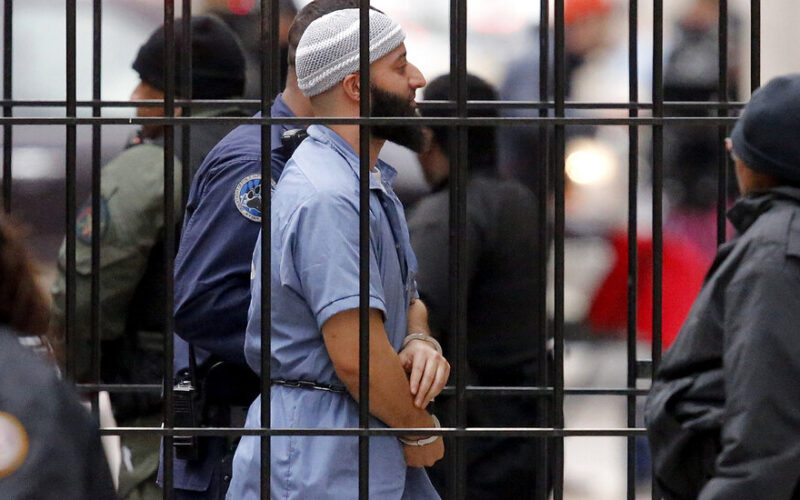Adnan Syed’s ‘Serial’ Murder Conviction Is Overturned, Adnan Syed, who had been in prison since he was a teenager for the murder of his ex-high school sweetheart, whose case was featured in the first season of the renowned podcast “Serial,” was released from prison on Monday after a successful appeal of his conviction.
The conviction was overturned “in the interests of fairness and justice” by Judge Melissa M. Phinn of the Baltimore City Circuit Court after she found that prosecutors had failed to turn over evidence that could have helped Mr. Syed at trial and had discovered new evidence that could have affected the outcome of his case.
Mr. Syed was given a 30-day period of home confinement while prosecutors decided whether to seek a new trial or drop the allegations against him. Two “alternative suspects” have been mentioned by prosecutors, but they have not been formally identified or charged.
The judge’s decision was to have the shackles taken off of Syed immediately: “At this time,” Phinn said. Mr. Syed smiled as he made his way up the courthouse steps, followed by a raucous group of cheering fans. Without uttering a word to the swarming reporters, he waved and got into a waiting car.
Mr. Syed, now 41 years old, was sentenced to life in prison in 1999 for the murder of Hae Min Lee, a former girlfriend, and high school classmate. Her body was discovered buried in a park in Baltimore County.
Mr. Syed, who was 17 at the time, had always maintained his innocence, and when “Serial” premiered in 2014, many people began to wonder if he had been given a fair trial. The case against Mr. Syed was thoroughly investigated over the course of 12 episodes, with the podcast becoming a cultural phenomenon thanks to its focus on the unusual circumstances surrounding his attorney, who died in 2004 after agreeing to be disbarred in 2001 following allegations of wrongdoing.
His conviction was overturned and he was granted a new trial this month after prosecutors claimed: that “the state no longer has faith in the integrity of the conviction.”
Prosecutors claimed in a motion filed in Baltimore City Circuit Court on Wednesday that they had discovered evidence implicating two “alternative suspects” and key evidence that they may have failed to disclose to Mr. Syed’s lawyers in violation of their legal duty after investigating the case for nearly a year with Mr. Syed’s lawyer.
According to the findings, there were “serious reliability flaws surrounding the most essential pieces of evidence” used to condemn Mr. Syed, such as cellphone tower data.
In the motion, prosecutors made clear that they were not claiming Mr. Syed’s innocence. And they indicated that after the inquiry was over, they would determine whether to hold a new trial or drop the accusations.
Concerns were raised by Ms. Lee’s family that they had not been given sufficient notice of the decision to annul the conviction by prosecutors. The family’s attorney, Steve Kelly, requested Judge Phinn to delay ruling on the application during a hearing on Monday.
But the state’s attorney argued that adequate notice had been provided, and Judge Phinn denied the motion.
While the court was on break, Mr. Kelly hurried to reach Ms. Lee’s brother, Young Lee, at his workplace so he could participate in the hearing through Zoom. Mr. Syed, who was present and wearing a shirt and tie, watched the argument unfold.
About 45 minutes later, when Mr. Lee addressed the court through Zoom, his voice cracked as he stated, “This is not a podcast for me.” For over two decades, “this is real life,” which is a nightmare.
He felt “betrayed” by the move to vacate and “blindsided” by it, and he was angered by the case’s many twists and turns over the past two decades. Mr. Lee stated, “It’s killing me and killing my mother. Every time I think it’s over and it’s ended, it comes back.”
Best Bets As Chosen By Our Editors
Richie Weeks spent his days sorting mail. At Night, He Transformed Into a Disco Icon.
In both R. Kelly’s and Bill Cosby’s cases, they were defended by the same aggressive attorney.
Approaches That Win People Over Findings from a recent study support the use of verbal communication when tensions run high.
Attorney Becky Feldman from Baltimore stated at the hearing, “Justice has been denied to Ms. Lee and her family by not insuring the correct offender was brought to justice.”
According to the request, the prosecution may have broken the law by withholding the files because they would have been favorable to the defendant under Brady v. Maryland, a landmark Supreme Court judgment from 1963.
One of the two “alternative suspects” had a conviction for attacking a woman in her car, while the other had convictions for serial rape and sexual assault, according to the inquiry conducted by the prosecution. A car belonging to Ms. Lee was discovered parked precisely behind the home of a relative of one of the people, according to information released by Ms. Mosby’s office.
A warning on the cellphone records stated that billing locations for incoming calls “would not be regarded trustworthy information for location,” thus the prosecution raised doubts about the data used to situate Mr. Syed near the burial site in their motion. The two specialists they questioned both agreed with that evaluation.
Ms. Suter said in a court motion on Wednesday that Mr. Syed’s conviction “rests on the shifting narrative of an incentivized, cooperative, 19-year-old co-defendant,” referring to Mr. Wilds. As of the year 1999, when our protagonist, Mr. Syed, was a mere teenager of 17, this was true. Still true even now.”









